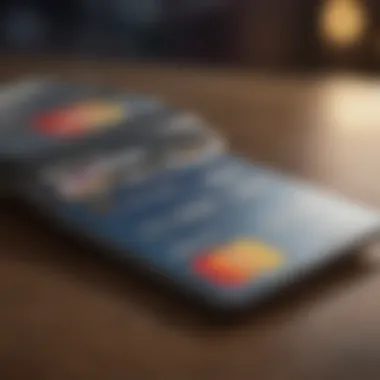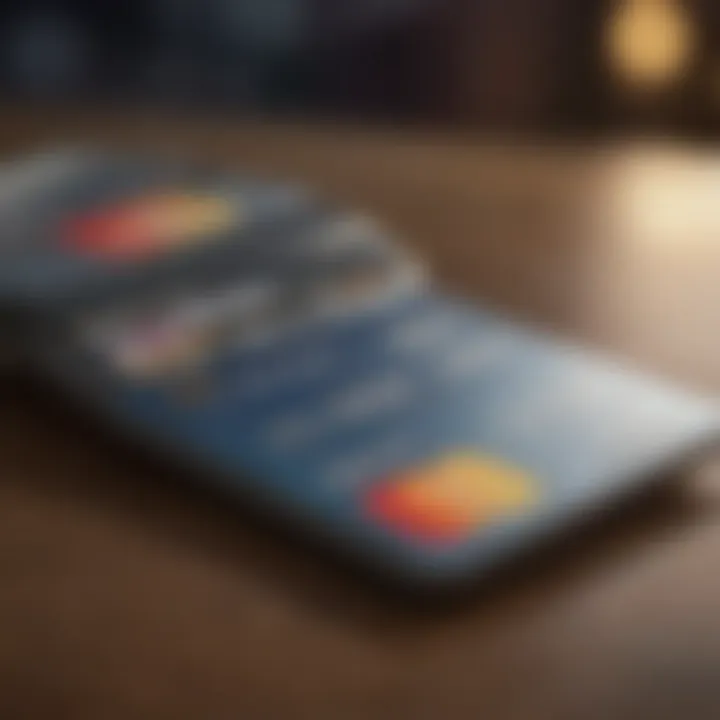Understanding Payment Methods for Money Orders


Intro
In today's financial landscape, understanding various payment methods is crucial for effective budgeting and money management. Money orders serve as a popular option for sending funds securely and easily. However, many individuals question how debit cards fit into this transaction type. This article will clarify the process of using debit cards to purchase money orders. It will cover significant topics such as potential fees, institutional policies, and practical tips for smart financial decisions while managing these transactions.
Preface to Money Orders
Money orders play a crucial role in the landscape of financial transactions. They provide a secure, reliable method of transferring funds without the need for a bank account or credit history. This section aims to ground the reader in the essential aspects of money orders, including their definition and common use cases. Understanding these foundational elements not only aids in choosing the right payment method but also enhances one’s overall financial literacy.
Definition and Purpose
A money order is a prepaid financial instrument that allows the purchaser to make a payment to a specified payee. Unlike checks, money orders do not require a bank account—thus, they represent a viable alternative for individuals without one. The purchaser pays the amount of the money order, plus a fee, which secures the funds for the recipient.
The primary purpose of a money order is to provide a safe method of sending money, especially for those who may be wary of sending cash through the mail or using electronic transfer methods. Money orders are generally considered to be more secure than personal checks since they are backed by the issuing institution, making them a preferred option for many transactions where trust is a concern.
Common Use Cases
Money orders are often used in various situations where security and convenience are paramount. Here are some common scenarios:
- Paying Bills: Many people use money orders to pay utility bills or other service providers. This method ensures that the payment is guaranteed.
- Rent Payments: Landlords may prefer money orders to personal checks, as they decrease the risk of bounced checks.
- Purchasing Goods: Some individuals buy items from private sellers online and use money orders to ensure that the payment is secure.
- Sending Money: Families often use money orders to send funds to relatives or friends, particularly when the recipient does not have access to a bank account.
"Using money orders can be an effective strategy for managing payments while avoiding overdraft fees or bouncing checks."
In summary, understanding money orders' definition and their practical applications empowers individuals to navigate their financial obligations effectively. This awareness helps in making informed decisions regarding various payment methods and enhances financial management skills.
Payment Methods for Money Orders
Understanding the different payment methods for money orders is crucial for individuals and businesses alike. This section aims to clarify the options available for purchasing money orders, helping readers navigate through the benefits and limitations of each method. Knowing how to make an informed choice can lead to significant savings, convenience, and increased financial literacy. The process of acquiring a money order often influences budgeting decisions, hence understanding these payment methods can optimize one's financial management.
Traditional Payment Methods
Cash
Cash remains a popular means of payment for money orders. One notable characteristic of cash is its instant form of transaction. When you pay in cash, there are no delays, no waiting periods, and immediate receipt of the money order. This simplicity makes cash a beneficial choice for many people. It is essential to consider that transactions using cash do not leave a paper trail, which could be an advantage or disadvantage depending on your record-keeping preferences. Some may find it easier to track expenses when using other methods; however, for others, the anonymity provided by cash is a significant benefit.
Checks
Checks provide a different approach in purchasing money orders. One main feature of checks is the direct link to bank accounts, allowing users to pay without the need for cash. This method is particularly popular among those who prefer to keep a formal record of transactions. Writing a check can be beneficial, as it outlines the amount clearly, and offers a level of personal security. However, checks can take time to process, meaning that the money order may not be available immediately. This delay can be a disadvantage when time is of the essence.
Credit Cards
Using credit cards for money orders introduces an element of flexibility. A key characteristic of credit cards is their capacity to facilitate larger purchases without the immediate need for cash. This option is particularly appealing for those wanting to manage cash flow more strategically. However, while credit cards offer rewards and benefits, they also come with potential drawbacks. Interest rates can be high, affecting your total expenditure if payments are not managed. As such, being aware of the credit card's terms is vital.
Emerging Payment Methods
Mobile Payments
Mobile payments, facilitated via smartphones and apps, are gaining popularity. The key characteristic of mobile payments is their convenience; users can purchase money orders from almost anywhere. Transactions can be completed quickly and securely, eliminating the need for physical cash or cards. This modern approach to payments is beneficial for those who prefer managing finances on-the-go. The downside is that not all financial institutions or money order providers accept mobile payments, which may limit accessibility for some users.
Cryptocurrency


Cryptocurrency has emerged as a novel payment method for money orders, although its acceptance is still developing. A unique aspect of cryptocurrency is its decentralized nature, allowing users to engage in transactions without going through traditional banking systems. This can be appealing for individuals seeking privacy and security in their transactions. However, the volatility of cryptocurrency values can pose risks. Users must consider if they are willing to accept potential fluctuations in their payment values when opting for this method.
Exploring various payment methods for money orders is crucial for optimizing personal finance.
In summary, each payment method has advantages and disadvantages, suitable for different needs and preferences. Traditional methods like cash, checks, and credit cards provide established options, while emerging methods like mobile payments and cryptocurrency present innovative solutions for tech-savvy consumers.
Using Debit Cards for Money Orders
Using a debit card to purchase money orders is an important topic for many individuals seeking alternatives to traditional methods. Debit cards offer a convenient way to ensure funds are available, as they draw directly from a bank account. The ability to make payments instantly can cater to urgent transactions and save time. However, each financial institution has its own policies on how debit cards can be used for money orders, and this must be considered carefully. Knowledge of fees associated with debit card payments also enhances budgeting skills, making it easier for users to manage their finances effectively.
Is It Possible?
Yes, it is possible to use debit cards for buying money orders, but the feasibility largely depends on the policies of the location where you plan to purchase the money order. Most local retailers or grocery stores allow the use of debit cards, provided the transaction amount does not exceed daily withdrawal limits set by the bank or the store’s policies. However, some banks may not permit this method for only money orders, requiring users to use cash or checks instead. Always check in advance so as not to be limited when seeking to obtain a money order.
Advantages of Using Debit Cards
Using debit cards has several advantages that make them a appealing choice for purchasing money orders.
Instant Transactions
One key aspect of instant transactions is speed. When using a debit card, funds are deducted from your bank account immediately, allowing you to obtain your money order quickly. This is greatly beneficial for individuals who need to send money in a hurry, for instance during an emergency. Instant transactions also minimize the risk of bounced checks, which can result in fees and delays. The convenience of this method makes it a popular option in today's fast-paced financial landscape.
Budget Management
Another advantage is the effective budget management that debit cards support. Because transactions are directly linked to your bank account, it's easier to track spending in real-time. This connection helps individuals maintain a clear view of their financial situation. Knowing that a transaction is a direct debit can prevent overspending. Debit cards also eliminate the need for carrying large amounts of cash, making them safer. Overall, the control offered by debit card payments adds to their attractiveness for managing finances.
Financial Institutions' Policies on Debit Card Payments
Understanding the policies of financial institutions regarding debit card payments is crucial when dealing with money orders. Different banks, credit unions, and retailers have varied rules that can affect fees, transaction limits, and overall convenience. Awareness of these policies empowers users to make informed decisions, reducing the risk of unexpected fees or denial of service.
Banks
Major Banks Overview
Major banks such as Chase, Bank of America, and Wells Fargo often provide robust debit card services when purchasing money orders. A distinct characteristic of these banks is their extensive ATM networks and branch presence, which can ease the process of obtaining money orders with debit cards.
The benefit here is clear: customers often enjoy greater accessibility to their funds and banking services. However, these banks can sometimes impose higher fees for using debit cards, especially when they're used for money order payments. Some customer feedback highlights concerns over service fees, which can detract from the advantages of using a debit card.
A unique feature is that major banks frequently offer rewards programs for using their debit cards, which can be a significant advantage for customers who transact regularly. However, the complexity of understanding terms for these rewards can be overwhelming for some users.
Specific Bank Policies
Specific bank policies can vary greatly when it comes to debit card payments for money orders. For instance, Chase might have different spending limits compared to Regions Bank. Often, larger banks have stricter policies, requiring a certain balance in the account to process a transaction.
A key characteristic here is the variability of fees across banks. Some banks might allow a free transaction, while others may charge $3 or more. This inconsistency can benefit customers who do their research but can also confuse those who do not. Users should pay attention to details regarding daily transaction limits and international fees if they plan to use their debit cards extensively.
Credit Unions
Credit unions often represent an alternative to traditional banks that may offer lower fees and friendly customer service. Many credit unions allow members to use their debit cards for money orders, sometimes without the fees associated with major banks.
One major advantage of credit unions is their personalized service. Members are often viewed more as clients than customers, which can lead to a better understanding of their financial needs. Keep in mind, though, that access to ATMs may be limited when compared to bigger banks. This can affect users who need to deposit funds regularly to purchase money orders.


Retailers and Grocery Stores
Retailers and grocery stores like Walmart and CVS offer convenient locations for purchasing money orders with debit cards. These outlets often provide a more straightforward and accessible process compared to banks. The ability to transact at familiar and regular shopping locations helps many users avoid the hassle of a bank visit.
However, one must be cautious, as retailers often impose their own fees that can range from $0.70 to $3. For many, convenience comes at a price. Additionally, the limits on money order amounts can restrict users who wish to send larger sums.
In summary, understanding the policies of financial institutions regarding debit card payments is not merely an academic exercise. It directly impacts how accessible and cost-effective money orders can be. Knowledge is the key to unlocking better financial choices.
Fees Associated with Debit Card Transactions
Understanding the fees associated with using debit cards for money orders is crucial for individuals aiming to manage their finances effectively. These fees can vary widely by institution and can impact the total cost of purchasing a money order. Knowing these fees empowers users to make informed decisions, minimizing unwanted expenses.
Processing Fees
Processing fees are a common charge incurred when using a debit card for a money order. These fees can be applied by the retailer or the financial institution involved in the transaction. Typically, they can range from a flat rate to a percentage of the transaction amount.
- Importance: Knowing these fees helps users budget accurately and avoid unexpected costs.
- Variability: Different locations may have differing processing fees, thus it is wise to inquire prior to making a transaction.
Some financial institutions may also impose their own processing fees. It's essential to check the policies of your bank or credit union to get a clear understanding. For those who frequently purchase money orders, accumulated processing fees can lead to significant costs over time.
Monthly Fees
Monthly fees may apply depending on the type of debit card account held by the user. Some banks charge a monthly maintenance fee that can encompass various services, including debit card transactions. Here are some key considerations regarding monthly fees:
- Account Type: Different account types may have different fee structures. Check if you are eligible for fee waivers based on balance or transaction volume.
- Budget Implications: Monthly fees can add up quickly. Users should factor these into their overall financial planning to avoid unanticipated deductions from their balances.
Understanding these aspects helps users negotiate better account terms and seek alternatives that might be fee-free.
ATM Fees
ATM fees can also affect how much a user ultimately pays when using their debit card to buy money orders. These fees can include:
- Withdrawal Fees: When using an ATM outside your bank's network, a withdrawal fee may be charged.
- Balance Inquiry Fees: Some machines may charge fees just for checking your balance.
"Always check with your bank about ATM network partnerships to minimize fees."
To avoid these fees, it is ideal to use ATMs affiliated with one's bank. Users should be strategic in locating ATMs to reduce unnecessary charges. Furthermore, if large amounts are needed, consider withdrawing larger sums to minimize multiple transaction fees.
In summary, understanding the various fees associated with debit card transactions is vital. This knowledge allows for better budgeting and financial planning, ultimately leading to more cost-effective use of money orders.
Security Considerations When Using Debit Cards
Using debit cards for money orders necessitates a strong focus on security. Financial transactions, regardless of the method, are vulnerable to various forms of fraud and theft. Understanding security considerations can significantly mitigate risks and protect personal information.
Fraudulent Activities
Fraudulent activities are a substantial concern when using debit cards. Various scams target users who are unfamiliar with how debit transactions function. Common forms of fraud include:
- Phishing Scams: Fraudsters may create fake emails or websites to trick users into revealing their debit card information. This can lead to unauthorized transactions and potential financial loss.
- Card Skimming: This method involves installing devices on ATMs or point-of-sale terminals to capture card information. Users need to be cautious and inspect machines before inserting their cards.
- Identity Theft: If a person’s debit card information is stolen, it can lead to identity theft. Criminals can open accounts or make purchases in the victim's name, causing long-term issues.
It's vital to monitor bank statements regularly. If there are any unfamiliar charges, they should be reported immediately. Quick action can help limit financial damage.


Protecting Your Information
Protecting personal information is fundamental to secure debit card use. Here’s how individuals can reinforce their security:
- Strong Passwords: Using strong and unique passwords for online banking accounts can reduce the risk of unauthorized access. Avoid simple or easily guessed passwords.
- Enable Alerts: Most banks offer transaction alerts via text or email. Activating these alerts can provide immediate notification of suspicious activities on your account.
- Secure Networks: Avoid using public Wi-Fi for conducting financial transactions. Hackers can exploit unsecured networks to intercept personal data. Preferably, use a secure, private network.
- Multi-Factor Authentication: Many banks now offer multi-factor authentication as an added layer of security. This requires users to verify their identity through an additional step, such as a one-time code sent to their phone.
- Educate Yourself: Being informed about current scams and methods of fraud can help users recognize potential threats. Regularly review resources such as Wikipedia or Britannica for updates on fraud prevention.
"An informed consumer is the best defense against fraud."
Alternatives to Money Orders
Exploring alternatives to money orders is essential for anyone seeking flexible payment options. Money orders can serve their purpose well, but they are not always the most efficient method for transferring money. Alternatives often provide fewer fees, faster processing times, and more convenience. Understanding these alternatives can help young professionals, students, and small business owners make informed financial decisions.
Bank Transfers
Bank transfers are one of the most common alternatives to money orders. This method allows individuals to send money directly from their bank account to another account.
Advantages of Bank Transfers:
- Speed: Many bank transfers, especially domestic ones, can be completed almost instantly or within one business day.
- Convenience: Transfers can be initiated online or via a mobile banking app, eliminating the need to visit a physical location.
- No Purchase Fees: Unlike money orders, which often come with a purchase fee, bank transfers may not have costs associated with them, especially when both parties use the same bank.
Considerations:
- Transfer Limits: Some banks impose limits on the amount that can be transferred at once, which may not suit all needs.
- International Transfers: If sending money abroad, fees and exchange rates can apply, making them more complex than simple money orders.
Electronic Funds Transfer
Electronic Funds Transfer (EFT) is another viable alternative. This method encompasses several ways to electronically transfer money, including direct deposits, debit card transactions, and bill payments.
Advantages of EFT:
- Efficiency: EFT transactions are processed quickly and securely.
- Automation: Many individuals set up automatic payments for bills which simplifies budgeting.
- Versatility: EFT covers a wide range of transactions, including payroll, vendor payments, and personal transfers.
Considerations:
- Potential Fees: Depending on the service or method used, some EFTs may incur costs, although many banks now offer fee-free options.
- Need for Bank Account: Unlike money orders, which can be purchased with cash, EFTs typically require a bank account or debit card.
"Choosing the right payment method can significantly impact your budgeting and financial management."
Epilogue
In the realm of financial transactions, understanding the various payment methods for money orders is crucial. This article has examined a range of topics related to using debit cards specifically for purchasing money orders. Several important elements arise from this discussion.
First, it is vital for consumers to be aware of the fees involved in using debit cards. Knowing the potential costs associated with processing, monthly requirements, and ATMs can greatly influence one’s decision-making process.
Second, the policies of financial institutions play a significant role. Each bank or retailer can have different stipulations regarding debit card transactions when buying money orders. Recognizing these differences can help avoid unexpected denial of services when attempting to make a purchase.
Finally, it’s important to consider security. Fraudulent activities are a persistent concern, and understanding ways to protect one’s information is critical. By being aware of potential risks, individuals can better safeguard their financial information.
Overall, making informed decisions regarding the use of debit cards for money orders can result in better budgeting and money management. Having clarity on these aspects enables consumers to navigate the complex financial landscape with greater confidence.
Summary of Key Points
- Debit cards can be used for money orders, but specific issues must be considered.
- Fees associated with transactions vary and can influence overall costs.
- Policies differ among financial institutions; knowledge of these is necessary.
- Security measures must be prioritized to prevent fraud.
Final Thoughts on Choosing Payment Methods
Choosing the best payment method for money orders involves analyzing several factors. This decision should not be taken lightly. Individuals need to match their financial needs with the suitable method, taking into account how fees, institutional policies, and security can impact their experience.















